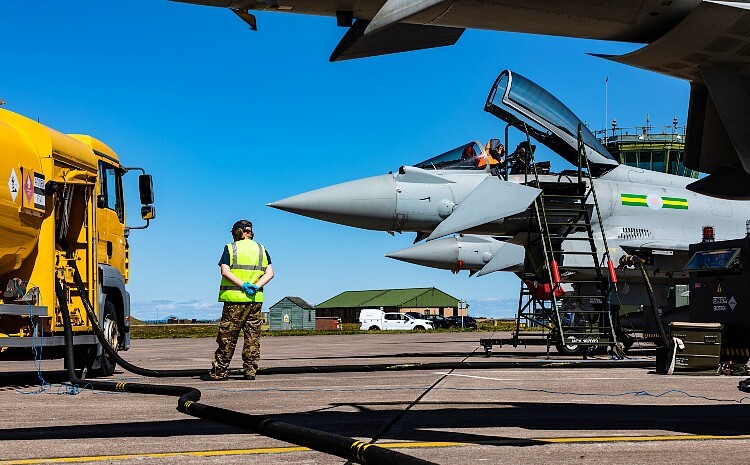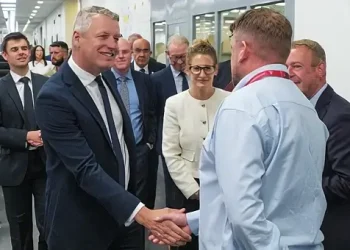The Royal Air Force (RAF) has taken a significant step forward in its sustainability efforts by incorporating Sustainable Aviation Fuel (SAF) into routine operations.
This initiative, primarily carried out at RAF Lossiemouth, represents a major stride in reducing carbon emissions while ensuring the UK’s national security.
Sustainable Fuel in Action
The RAF is now using a blend of conventional and sustainable aviation fuels in aircraft like the Typhoon and Poseidon, which operate from RAF Lossiemouth in northern Scotland.
RAF Lossiemouth, one of the UK’s busiest stations, plays a crucial role in maintaining the nation’s security with its Quick Reaction Alert force, ready to deploy at any time.
Earlier this year, the RAF received an initial delivery of four million litres of blended SAF, with an additional five million litres expected in the coming months.
The use of this fuel not only contributes to the reduction of carbon emissions but also enhances the RAF’s operational capability by making its fuel sources more sustainable.
A Milestone in Defence and Sustainability
The Ministry of Defence updated aviation fuel standards in 2020, allowing up to 50% sustainable sources in fuel mixes for defence aircraft.
This change is part of a broader strategy to reduce carbon emissions across the UK’s defence sector, aiming for net-zero emissions by 2040.
The introduction of SAF into routine operations underscores the RAF’s commitment to sustainability without compromising national security.
-
Main Points on Sustainable Fuel Sources:
- Hydrogenated fats and oils
- Wood waste and biomass
- Alcohols, sugars, and household waste
- Algae and genetically modified bacteria
The RAF’s efforts align with the UK government’s broader “Jet Zero” strategy, which seeks to decarbonize aviation and achieve at least 10% SAF usage in the UK’s fuel mix by 2030.
This initiative is not only about reducing carbon emissions but also about securing the UK’s energy independence by reducing reliance on traditional fossil fuels.

Industry and Government Collaboration
The successful integration of SAF into RAF operations results from close collaboration between the Ministry of Defence and industry partners.
Director Support Air Vice-Marshal Shaun Harris emphasized the importance of this partnership, stating,
“We remain at the forefront of this important work with industry partners, and introducing sustainable aviation fuel to one of our busiest stations demonstrates our commitment.”
RAF Lossiemouth’s Station Commander Group Captain Sarah Brewin added,
“The routine use of sustainable aviation fuel represents an important milestone in the RAF’s journey towards helping mitigate against climate change.”
Sustainable Aviation Fuel at RAF Lossiemouth |
Details |
|---|---|
| Total SAF Delivered | 4 million litres (initial) |
| Next Delivery | 5 million litres |
| Aircraft Types | Typhoon, Poseidon |
| Location | RAF Lossiemouth, Scotland |
| Operational Impact | Enhanced sustainability and energy security |
Looking Ahead
The RAF’s adoption of SAF marks a turning point in the UK’s defence strategy, combining cutting-edge technology with a firm commitment to sustainability. This initiative not only reduces the RAF’s carbon footprint but also sets a precedent for other sectors within the UK and beyond.
As the RAF continues to integrate SAF into its operations, it paves the way for wider use in both military and commercial aviation, reinforcing the UK’s position as a leader in sustainable technology.
Passing Shot
By incorporating SAF into routine missions, the RAF demonstrates that it is possible to achieve operational excellence while also taking significant steps towards a more sustainable future.
This initiative, underpinned by strong industry partnerships and government support, reflects the RAF’s dedication to both national security and environmental responsibility.
Sources: THX News, Ministry of Defence, Carbon Brief & Lord Coaker.









